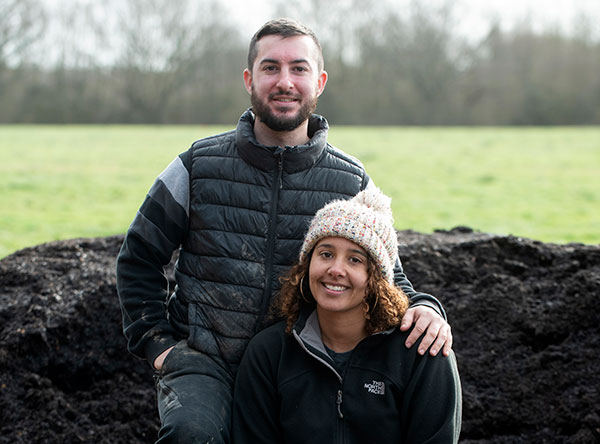When Sinead Fenton and Adam Smith moved from London to Sussex two months ago, they were raring to begin their new career in farming. Their four-and-a-half-acre plot at Aweside Farm in Arlington had previously been used to farm non-organic maize but Fenton and Smith, both 28, are busy transforming it by creating raised beds, planting thousands of trees, constructing a greenhouse ready to propagate and raiding their seed bank for the best colourful heritage veg.
Back in the city, the couple grew edible flowers, cut flowers and specialty greens on a small allotment an hour’s commute from their flat. Alongside full-time jobs, they sold produce direct to restaurants but the set-up was precarious with no formal contract. “We were shaping that land but we felt insecure – we wanted to do something meaningful but we didn’t have the capital or the connections to figure out our next steps,” says Fenton.

“It’s no secret that access into farming for new entrants is really hard in the UK. Given our backgrounds growing up in cities with no links to food and farming, the chances of us being able to pursue livelihoods in this sector were going to be slim.”
Then they discovered that social enterprise Ecological Land Cooperative (ELC) enables aspiring farmers like them to set up their own residential smallholdings on marginal agricultural land. They jumped at the chance to apply to the scheme, develop a robust business plan with experienced growers and receive invaluable mentoring while paying their rent over 25 years like a mortgage payment.
Nearly half the land in England is owned by just 25,000 people – less than one per cent of the population, but ELC readdresses the imbalance in land ownership by making farming more feasible, affordable and accessible to new entrants. Founded in 2009, the co-op plays the role of both supportive land owner and financial aid, offering community-owned residential farms for ecological land users at five low-impact, sustainably-managed sites in Cornwall, Devon, Somerset, Gower and East Sussex covering a range of farming practices, from a microdairy with rare breed Guernsey goats to the herbalist making home-grown tinctures.

Now, a new fundraising appeal plans to raise £400k in the next six weeks to help fund 18 new small farms on six new sites by the end of 2023, therefore creating a mosaic of ecological, and often organic, farms to regenerate rural areas.
ELC co-founder and now policy campaigner, Zoe Wangler, is “absolutely chomping at the bit to do more and get more land” but she explains that ELC moves slowly because land is so expensive: “Land prices have never been higher at £9k/acre and new entrants simply don’t have access to capital, plus land isn’t that available to rent.”
The cost of rural housing is another barrier, but Wangler and her team work hard to negotiate planning permission to enable ELC farmers to live on their own land in temporary housing.
“It’s low-cost living here,” adds Smith, who explains that they essentially live off-grid in their caravan. “Our electricity supply comes direct from our solar panels, the willow coppice will provide our firewood, we have compost toilets so there’s no sewage waste, and we’re currently rainwater harvesting,” he explains.
“Without ELC, we wouldn’t have been able to set up our own farm like this,” adds Fenton.
But with restaurants and florists closed due to the current coronavirus pandemic, their business plan is already being put to the test. Now, they’re planting more veg to supply locally, until normal service resumes when they can sell edible flowers and specialty greens at markets and direct to chefs.
According to Roz Corbett, campaigns and policy coordinator for Landworkers’ Alliance, small-scale mixed farming enterprises can play an important role in creating resilience by localising food supply chains, whereas the impact of longer supply chains falling through is massive.
“By collaborating with other small farms, sharing facilities and selling direct to customers, for example via veg box schemes or farmers’ markets, ELC’s small-scale farms can adapt their business supply if and when demand changes and support each other in these changes,” she explains.

“As well as creating variety and flexibility in their business models, agroecological faming involves farming methods such as agroforestry and regenerative grazing, so biodiversity becomes engrained in the land’s ecology. So they might not be so vulnerable to a particular pest influx or future changes in climate.”
Fenton agrees that monoculture is a high-risk strategy with changing climates and that conventional farming needs a shake-up: “Some farmers assume that this field will only ever be good to grow maize, but by looking after the land differently, we can transform it. We can’t just rely on one crop; we need fall-back options if one thing doesn’t work.”
Wangler adds that ELC is based on a small-scale garden allotment approach more than a mechanised farming approach: “At Greenham, our site in Devon, one local farmer said the plot we bought was unfarmable – it was waterlogged, but now it’s productive thanks to agroecology. But it’s terribly complex; it’s not just about land, it’s about society and politics.”










Great project!